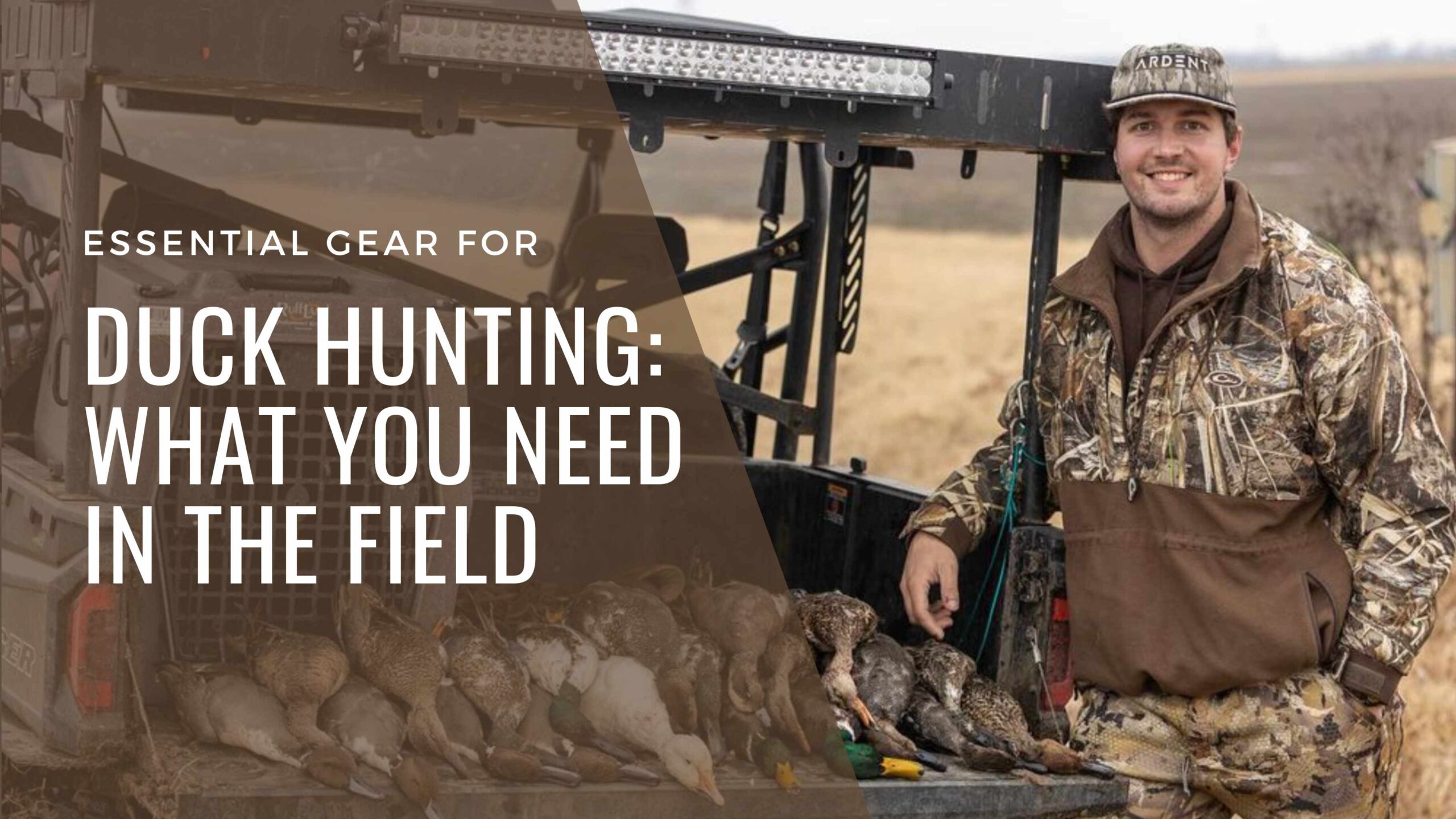
Discover the essential gear for duck hunting and learn what you need to succeed in the field. From decoys to waders, we cover the must-haves for a great hunt.
Read on to learn about my process.
Duck hunting is a thrilling experience, but success in the field depends on having the right gear. Whether you’re a seasoned hunter or new to the sport, having the proper equipment can make or break your hunting trip. In this guide, we’ll cover the essential gear every duck hunter needs, from decoys and shotguns to waders and calls. With the right tools, you’ll be ready for a successful and enjoyable hunt.
1. Shotgun and Ammunition
The most important piece of gear for any duck hunter is the shotgun. A reliable 12-gauge or 20-gauge shotgun is the standard choice for duck hunting. Consider one that is designed for waterfowl hunting, such as the Benelli Super Black Eagle 3 or the Remington V3.
When selecting ammunition, look for non-toxic shot (required by federal law for waterfowl hunting), such as steel shot or bismuth. The shot size you choose will depend on the type of ducks you’re targeting and the distance of your shots. A common choice is #2 or #4 shot for larger ducks like mallards, while #6 or #7 is great for smaller species like teal.
For more information on shotguns and ammo, check out Field & Stream.
2. Waders: Stay Dry and Comfortable
Duck hunting often involves spending hours in cold, wet conditions, so a good pair of waders is essential. Waders keep you dry as you navigate through marshes, ponds, or rivers. When choosing waders, consider the following:
- Material: Neoprene waders are a popular choice due to their durability and warmth. For warmer climates, breathable waders made of Gore-Tex can provide comfort without overheating.
- Insulation: For colder weather, opt for waders with insulation (measured in grams) to keep you warm. A minimum of 800 grams of insulation is recommended for hunting in cold water.
- Boots: Integrated boots should provide both insulation and traction, helping you stay stable in muddy or slippery terrain.
Some top-rated waders for duck hunting include Cabela’s SuperMag 1600 and Frogg Toggs Amphib Neoprene Waders.
Learn more about selecting the best waders at Cabela’s and Bass Pro Shops.
3. Decoys and Spread Setup
Decoys are critical to drawing ducks into shooting range. A well-planned decoy spread will increase your chances of success by convincing ducks to land near your blind. Here’s what you need to know:
- Decoy Variety: Use a mix of species in your spread to make it look more natural. For example, a combination of mallard, pintail, and teal decoys can attract a wide range of ducks.
- Motion Decoys: Ducks are wary of stagnant spreads. Adding motion decoys like spinning wing decoys or jerk rigs can simulate movement, making your spread more convincing.
- Placement: Arrange your decoys in a “U” or “J” shape with an open landing zone in the middle. This setup encourages ducks to land within shooting range.
High-quality decoys like Avian-X Topflight or Dakota Decoys are durable and effective in the field.
For more decoy setup strategies, visit Ducks Unlimited.
4. Duck Calls: Bring Them In
Mastering the use of duck calls can significantly improve your chances of success. Duck calls imitate the sounds of ducks, drawing them closer to your location. There are several types of calls you’ll want in your arsenal:
- Single-Reed Calls: These produce loud, sharp sounds that are great for long-range calling but require more skill to master.
- Double-Reed Calls: Easier for beginners, double-reed calls produce softer, raspier sounds, ideal for close-range ducks.
- Whistles: Used to mimic the sounds of specific species like pintails, wigeons, and teal.
Popular duck call brands include Duck Commander, Echo Calls, and Zink Calls.
Learn more about different duck calls at Outdoor Life.
5. Hunting Blind: Stay Hidden
A well-camouflaged hunting blind is essential for remaining hidden from ducks. There are different types of blinds available depending on your hunting environment:
- Layout Blinds: These are portable, low-profile blinds perfect for hunting in open fields.
- Boat Blinds: Ideal for hunters who set up in the water, boat blinds attach to your boat and provide cover while you hunt.
- Permanent Blinds: For those with a specific hunting location, building a permanent blind can offer more stability and comfort.
Camouflage is key, so make sure your blind matches the environment where you’re hunting. Blinds like Avery Outdoors Power Hunter or Banded Axe Blind are popular choices for waterfowl hunters.
For more tips on choosing the right hunting blind, check out Realtree.
FAQs
What type of shotgun is best for duck hunting?
- A 12-gauge or 20-gauge shotgun with a synthetic stock is ideal for duck hunting. Some top models include the Benelli Super Black Eagle 3 and Remington V3.
How many decoys should I use for a successful hunt?
- The number of decoys depends on the size of the hunting area and the species you’re targeting. A spread of 12 to 24 decoys is a good starting point for most hunters.
Do I need insulated waders for all duck hunts?
- Insulated waders are essential for hunting in cold water. For warmer climates, breathable waders without insulation may be more comfortable.
What’s the best way to store and transport decoys?
- Use a decoy bag with padded straps to store and carry your decoys. Keep them clean and avoid overstuffing the bag to prevent damage.
How do I learn to use duck calls effectively?
- Practice makes perfect! Start with a double-reed call if you’re a beginner and watch tutorial videos or take a waterfowl calling class.
Helpful Tips for a Successful Hunt
- Scout Early: Know where the ducks are flying and feeding by scouting your hunting area ahead of time.
- Dress in Layers: The weather can change quickly during duck season. Layer your clothing to stay comfortable throughout the day.
- Stay Patient: Duck hunting requires patience. Be prepared for long hours of waiting, but stay alert for when ducks start moving.
- Conceal Your Movement: Ducks have excellent vision, so minimize movement and wear proper camouflage to blend in with your surroundings.
Conclusion
Having the right gear is crucial for a successful duck hunting trip. From a reliable shotgun and well-placed decoys to insulated waders and effective duck calls, each piece of equipment plays a vital role in your overall success. By investing in quality gear and learning how to use it effectively, you’ll increase your chances of having a great day in the field.
Remember, preparation and patience are just as important as the gear itself. With this guide, you’re now equipped with the knowledge to gather the essential gear for duck hunting and make your next hunt a successful one.
